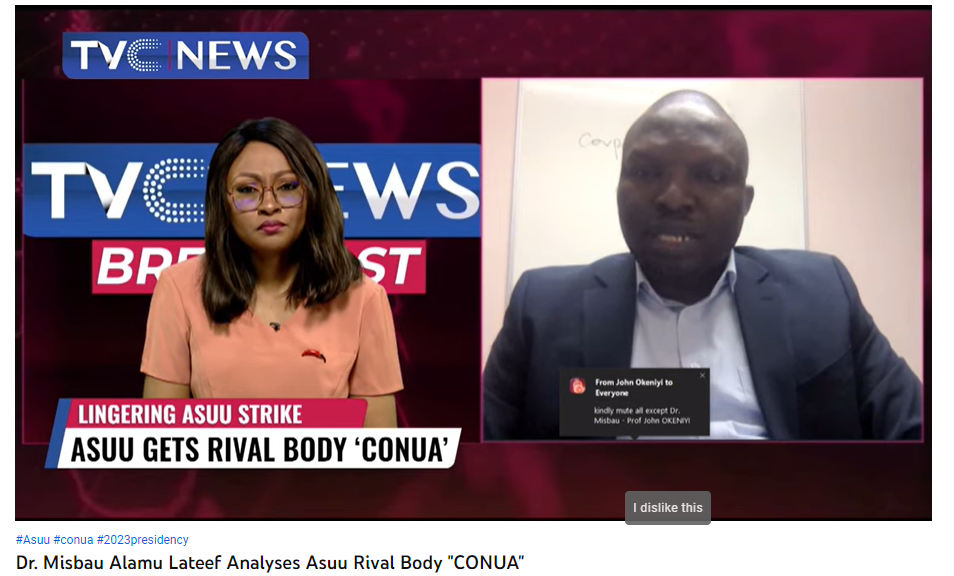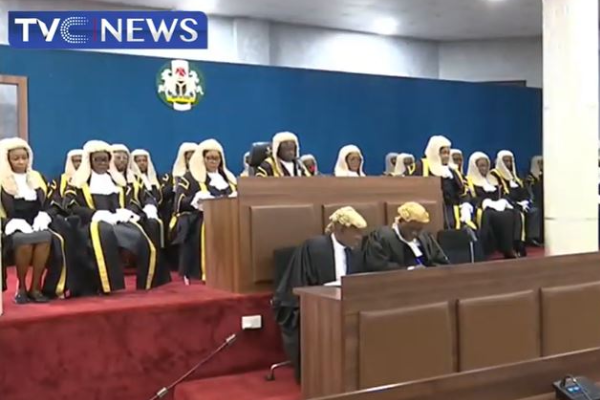The issue of Industrial Action within the Education Sector especially in the University system is one that is no longer tenable and demand a paradigm shift for development and issues in the sector to be addressed and CONUA is in the best position to offer the shift.
The National Legal Adviser of the Congress of University Academics, Dr Musbau Alamu Lateef, disclosed this while Speaking exclusively on the TVC News Breakfast with Veronica Dan Ikpoyi.
Dr Lateef said the Congress of University Academics is not competing with the Academic Union of of Universities, ASUU, but presenting an alternative view on an issue which has made a mockery of the Nigerian University system.
He added that those who have repeatedly shut down the University system over the last decade plus need to see the alternative view to what they currently present as the only way.
He disclosed that the repeated disruption and shutting down of the system have not achieved any concrete aim other than the signing of agreements which could be signed through what he described as constructive engagement.
He also disclosed that CONUA already has a membership spread in 20 Universities with Others bracing up for inclusion.
He called for constant, constructive and unbiased engagement to negotiations between government and the University Unions.
He frowned at what he said is the closed mindset from members of ASUU who have engaged the government over time making it impossible to get results.
He disclosed that this is the alternative view that CONUA is offering.
Read Excerpts of his interview below…
“Right, thank you so much and it is pleasing to be on your TV Morning programme. Before I answer your question permit me to quickly correct what has become a progressive error in the media regarding the registered name of CONUA. The registered name is Congress of University Academics as opposed to the reference to the union as Congress of Nigerian University academics. So it is important to stress that the word Nigeria is not there. And of course, because this is a trade union registered under the laws of Nigeria, it is implied that it is a Nigerian trade union of teachers. Now, coming back to your question, how does the Registration of CONUA address the developmental issue in Tertiary education Nigeria? If I can rephrase in that way.
Over the past decade we have had protracted, I would say disruption in our academic activity, particularly academic institutions. And the reason for this various experts have concluded, I would say first and foremost, failure of government to fund education properly. And also there has also been issue of indefinite strike actions from the trade union that comprises not only the academics but also other variants of public employees. So this has been the issue for the past decades and then there has also been the issue of the crisis.
This has affected the quality of education in our society because there is a direct link between table academic calendar and quality of the programmes and even the graduates. So when you have perennial breakages of a life or breaking academic calendar, it impacts on quality, it disrupt lives and all of that. So as a result of this challenge and given other challenges, there are lecturers or teachers who have come to reason that perhaps there is a better way to undo this perennial disagreement between governments and their employees at the Federal University in particular.
And we thought that we could bring a better or adult perspective to addressing the challenges in our academic system, particularly the face of the perennial face off between governments, one government after the other. So basically what CONUA wants is to do differently therefore is to bring to the table a different approach in paradigm shifts, if you like, to negotiating with governments.
Okay, before I address the new approach, let me quickly correct your point that the presence of CONUA is not on ground. That’s not correct. As I speak to you now, we have presence in not less than 20 universities. And since the registration of CONUA two days ago, there have been other campuses that have signified interest in joining CONUA. And you will agree with me that there is normally a time to grow, a time to build membership, and a time for development. CONUA has just been registered. There have been lecturers or teachers who all the years have waited for this opportunity of an alternative to dispute, I would say a resolution in our Tertiary institution. Now, the different approach we bring to the table is simple. We call it constructive engagement. And what is constructive engagement? We seek to engage with all stakeholders without necessarily shutting down the system. We are saying that constant shutting down of the system have created more problems than solving any problem. So therefore, we will continue to engage, we will continue to discuss and what I say stakeholders are meeting national assembly, for example, not only the Ministry of Labour and employment, not only the employees. So all of these stakeholders, and the National University Commission, for example, and all of them. So we seek to engage all stakeholders in addressing the challenges of funding, challenges of revitalisation in the university system and all of that. And we believe that negotiation can never be enough. So there’s no point why we cannot continue to discuss and negotiate, why we continue to work. And the simple example I can bring to justify this is we have been on strike for eight months on the part of CONUA, I will say a strike that was forced on our members. Now, for the past eight months, what exactly has been achieved? Nothing. If this fact is called out today, nothing again will have been achieved other than maybe signing some agreement. So why do we have to shut down the system for several weeks and for several months just to sign an agreement that may not actually, go ahead. So why should we have to shut down the system just to sign an agreement? And like I said, if it’s like a scholar today, nothing will have achieved other than sign another agreement. So that agreement will have been negotiated. The discussion will have been sustained. Continue. Why we continue to work? There is no perfect work environment or workplace environment anywhere in the world. This is where the issue of dispute between labour, the employee and the employer is something that is never ending. It is something that you continue to debate, something you continue to discuss. So you can never have a one off solution at any point in time. The wages will never be enough, the employer will never pay enough. So you continue to negotiate, you continue to discuss. But when you bring down the system, you shut down the system in a bid to, according to you, solve a problem, you create more problem and that is exactly what CONUA seeks to change. So we do not support the idea of indefinite or what some people call Total strike. Not that we do not recognize strike as a liberal tool in industrial relations. You can’t take that away, but it is not really about whether you go on strike or not.
So these are the issues and this is kind of partnership that we tend to bring. We believe”
“Well, it is true that government over the years have not been maybe cooperating or listening enough and people have said the only language that government understand is to go on strike. But the question you ask yourself is this now if you have consistently gone on strike and then you have achieved little or nothing, or you have achieved not much, or you have even succeeded in causing more disruptions, then do you continue to do the same thing when eventually after your strike may have been concluded, you will still have to go to the same round table? So what I’m saying is that you cannot sufficiently discuss. So you continue to discuss until you are able to achieve a resolution or an agreement. By the way, when we say agreements or resolutions, you say when parties go to the table with the mindset that you are negotiating with your enemy or with the mindset of a it is either our way or no way, or it is either take it or leave it, there is hardly any possibility that a resolution will be achieved. But when you go to a table with that open minded approach, when parties are willing to give and take. So you will realize that you tend to achieve more results than shutting down the system, particularly in the manner that will put our youth, the future of this country, into Jeopardy. For eight years, we have rendered this huge population. We have rendered them redundant. Many have gone into vices, we have recorded debt. And all of that I personally know, at least by students who have lost scholarship opportunity because of the restriction in the academic system. So the question again is that for the past eight months, what exactly have you achieved? Not one single brick has been added to any university structure. Not one book has been added to any library. Not one bucket or bowl of chemical has been added to any laboratory. So some of these things, there are things that will or may be achieved without necessarily shutting down the system. And I’m not saying CONUA exists basically because of the idea of preventing shutting down the system. We exist also particularly because we think things can be done better than the way ASUU handled it. And more importantly under Section 14 of the nation is the concern of Nigeria. That is what we call freedom of association. So ASUU has become, if you ask me, an example that is so monotonous, and there are many lecturers or teachers in our university who do not necessarily share the ideology or modules of ASUU.





